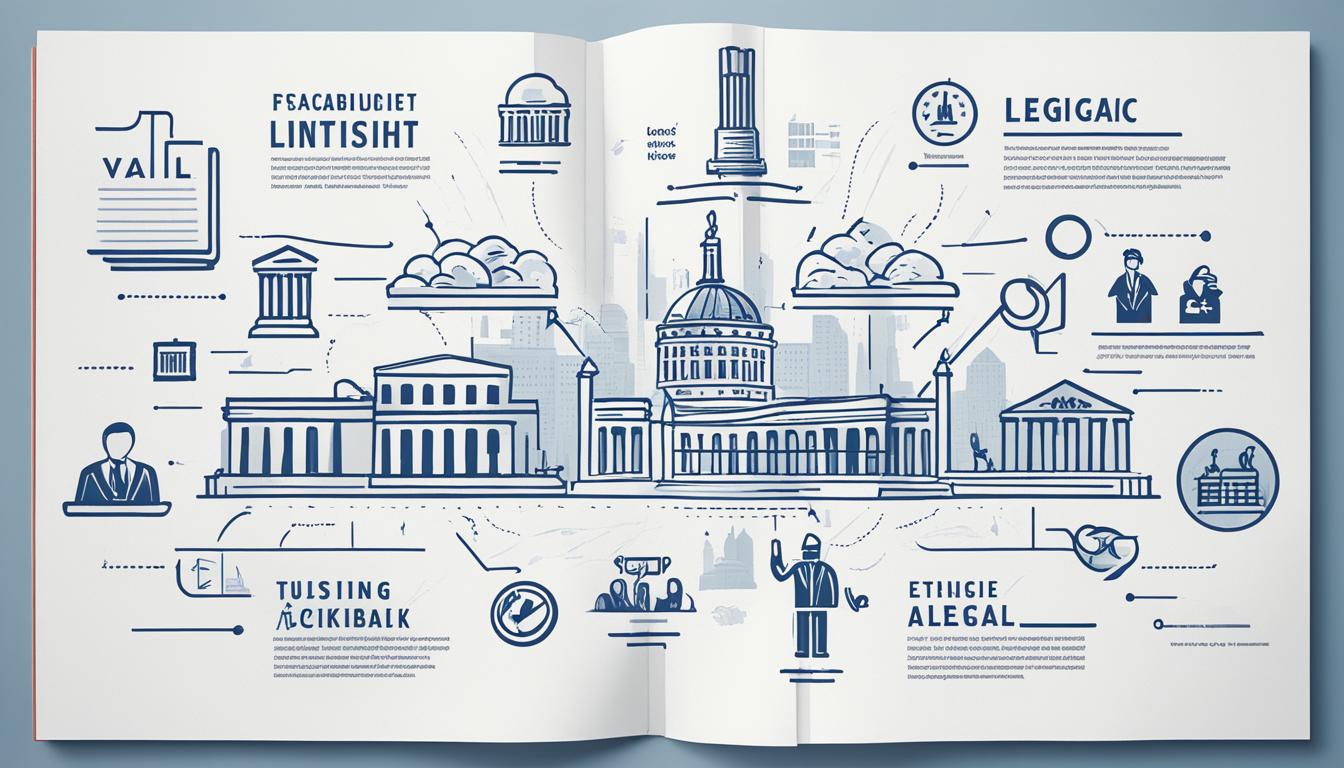Understanding the Anti-Kickback Statute Basics
The U.S. Department of Health & Human Services found something big. In just one year, their work against healthcare fraud got back over $2.6 billion. This huge amount shows how big healthcare fraud is and why it’s crucial to follow strict rules. The Anti-Kickback Statute (AKS) is a key law aiming to stop bad practices in healthcare. It sets rules for how providers should interact with others. The goal is to make sure decisions about patient care are based on health needs, not money.
The AKS is all about keeping federal healthcare laws in check. It tells healthcare providers to follow the rules closely to avoid trouble. Trouble can mean legal issues, losing money, and damaging their reputation. As healthcare gets more attention, understanding and following these laws is a must. This protects healthcare workers and the people they look after.
Key Takeaways
- The massive financial recoveries from healthcare fraud highlight the critical nature of compliance with federal healthcare laws.
- The Anti-Kickback Statute plays a central role in deterring healthcare fraud and upholding ethical practices.
- Healthcare providers must institute robust compliance measures to avoid severe legal and financial consequences.
- A thorough understanding of AKS provisions is necessary for maintaining lawful operations within the healthcare system.
- Continuous vigilance and adherence to federal laws are non-negotiable for reputable healthcare practices.
The Role of Federal Healthcare Laws in Upholding Ethical Practices
Federal healthcare laws fight against fraud to protect patient care and reduce costs. They are key to keeping medical practices ethical. These laws prevent fraud and ensure activities in healthcare are legal and clear.
Key Healthcare Fraud and Abuse Laws
The Anti-Kickback Statute stands out among these laws. It stops money from affecting medical choices. Together with the False Claims Act and others, they set the legal boundaries. They help prosecute those who break the law.
Governing Bodies and Enforcement Agencies
The Department of Health and Human Services and the Department of Justice are crucial in enforcement. They have the power to check, oversee, and punish those who don’t follow the rules. This helps keep healthcare honest and trustworthy.
Consequences of Non-Compliance
Not following the laws can lead to big penalties or even court. Healthcare providers could be banned from federal programs, which can be a huge blow. It shows how serious following these laws is for maintaining ethical healthcare.
Comprehending the Provisions of the Anti-Kickback Statute
The Anti-Kickback Statute provisions keep healthcare practices honest. They stop payments for patient referrals. Knowing these rules helps healthcare providers avoid legal troubles while caring for patients.
The prohibition on kickbacks is key in this statute. It stops all forms of payment that could sway clinical choices. The term ‘remuneration’ covers anything of value, making the law wide-ranging.
Healthcare providers must be careful to avoid kickbacks. Creating strict rules and teaching about what’s not allowed is very important.
The table below highlights key aspects of the Anti-Kickback Statute and measures for ensuring compliance:
| AKS Provision | Explanation | Compliance Strategies |
|---|---|---|
| Kickback Prohibition | Banning receipt or payment of any form of remuneration in exchange for patient referrals. | Conduct regular training sessions for staff to recognize prohibited practices. |
| Remuneration Scope | Inclusive of cash, gifts, or in-kind services that could influence healthcare services. | Implement a compliance officer role to oversee and enforce AKS-related policies. |
| Exception Handling | Specific activities and arrangements are carved out as safe harbors under the statute. | Regularly review and update company policies to align with current safe harbors. |
| Enforcement Readiness | Potential for civil and criminal penalties necessitates a proactive approach. | Establish an internal reporting mechanism for potential AKS violations. |
To stay compliant, healthcare practices must be aware of and commit to ethical behavior. This means following the law closely. Doing so shows they are committed to high-quality, honest care.
In-depth Look at the Types of Remuneration Under the Anti-Kickback Statute
Exploring the kinds of remuneration in the Anti-Kickback Statute is key. It lets healthcare professionals understand legal exchanges. This knowledge helps them follow the law closely.
Defining “Anything of Value”
The term “anything of value” includes money and other benefits. This wide view stops any undue influence on healthcare choices. It keeps the integrity of decisions in healthcare.
Indirect vs Direct Remuneration
It’s important to know the difference between direct and indirect payments. Direct payments are simple, usually involving one step. Indirect payments are more complex, potentially hiding the kickback’s true nature.
Monetary and Non-Monetary Kickbacks
Monetary kickbacks are straightforward, but non-monetary ones are also important to notice. They can be free services or gifts that seem normal but are not. Each can violate the Anti-Kickback Statute.
The Intersection of Anti-Kickback Statute and the False Claims Act
The Anti-Kickback Statute (AKS) and the False Claims Act (FCA) are key in keeping healthcare honest. They work together to stop healthcare fraud. This helps keep the industry on the right path.
Understanding the Connection
The AKS stops anyone from paying for patient referrals if the service is covered by federal programs. But if this leads to false claims, it also breaks the FCA rules. So, breaking the AKS often means you’re also going against the FCA.
This creates a strong link between the two. Violating these laws can lead to heavy fines or even jail time. It shows how seriously these wrongdoings are taken.
Whistleblower Provisions and Protections
Whistleblowers are crucial in exposing fraud in healthcare. They get special protection and rewards for their actions. This helps the industry stay honest and accountable.
Whistleblowers are often the unsung heroes in our fight against healthcare fraud. Their courage and actions save not only invaluable taxpayer dollars but also help maintain the integrity of our healthcare system.
There’s a strong focus on encouraging people to report any wrongdoings. The AKS and FCA protect those who speak out. This helps to prevent fraud and maintain trust with the public.
| Anti-Kickback Statute (AKS) | False Claims Act (FCA) | Whistleblower Impact |
|---|---|---|
| Prohibits kickbacks for referrals | Prevents false claims for government payments | Facilitates reporting of violations |
| Focused on healthcare providers | Applicable to all government contractors | Protections and incentives for reporters |
| Imposes criminal and civil penalties | Possibility of treble damages | Qui tam provisions allow private suits |
These laws are key to managing public healthcare funds. Following the AKS and FCA is about doing what’s right. It’s about caring well for others and using resources wisely.
Legal Ramifications: Criminal Penalties, Fines, and Exclusions
Understanding the risks of not following health care laws is crucial. Health care providers who break the Anti-Kickback Statute can face criminal penalties, civil penalties, and even exclusion from federal health care programs. This shows how serious these issues are.
Understanding Criminal and Civil Penalties
If a provider is caught breaking the AKS, they could go to jail or pay huge fines. These tough consequences are meant to stop wrong actions in health care. At the same time, civil penalties can mean more fines and triple the damages. This highlights why it’s so important to always follow the rules in health care.
The Impact of Exclusion from Federal Health Care Programs
Being excluded from federal health programs is a big deal. It means a provider can’t get money from programs like Medicare and Medicaid. This makes it hard to take care of many patients and hurts the provider’s business.
| Penalty Type | Consequences | Impact on Healthcare Providers |
|---|---|---|
| Criminal Penalties | Imprisonment, criminal fines | Deterrence, reputation damage, personal freedom at stake |
| Civil Penalties | Civil fines, treble damages | Heightened financial liabilities, intensified oversight |
| Exclusion from Programs | Ban from federal health care programs | Lost revenue, diminished service capabilities, eroded trust |
Staying compliant in health care is a must—it’s not just an option. The threat of penalties and exclusions means health care providers must be careful and proactive. This helps keep their practices honest and allows them to keep helping patients through federal health programs.
Essential Compliance Measures to Prevent Anti-Kickback Violations
Sticking to the Anti-Kickback Statute (AKS) is key for fair healthcare. Organizations need to take active steps with compliance measures to lower violation risks. Knowing and creating internal compliance programs is crucial to deal with complex rules. This also keeps possible legal problems at bay.
Development of Internal Compliance Programs
Creating an internal compliance program is very important for healthcare groups. It should meet legal standards and fit the organization’s operations. The program must cover training, making policies, and doing regular checks.
Teaching staff about safe harbor regulations helps build a compliance-based culture.
Navigating Safe Harbor Regulations
The Office of Inspector General (OIG) provides safe harbor regulations to avoid AKS issues. To follow these, healthcare places must check investments and set fair referral deals. They need a legal expert or a compliance officer skilled in these areas.
Understanding how internal compliance programs and safe harbor regulations work together helps healthcare pros avoid AKS issues. This keeps their practices honest and high-quality.
Anti-Kickback Statute vs. Stark Law: Distinct Differences
Healthcare law has tricky parts, like understanding the Anti-Kickback Statute (AKS) and the Stark Law. Both rules fight against wrongdoings in healthcare by controlling money matters and self-referrals. It’s key for healthcare workers to grasp what each law aims to do, their focus, and what happens if they’re broken.
Comparison of Legislative Intent and Scope
The AKS is a law that stops anyone from offering things of value to get healthcare referrals. It’s meant to keep healthcare honest by banning payments that might sway referrals. On the other hand, the Stark Law deals with self-referrals by doctors. It says doctors can’t send patients to places they have money ties with, for certain health services covered by Medicare or Medicaid, unless exceptions apply. This shows the Stark Law’s tighter focus on self-referrals.
Financial Relationships and Self-Referrals
Knowing how money ties work is key to follow both laws. The AKS looks at any deal that could be seen as a kickback. The Stark Law is more specific. It looks at ownerships or pay deals that might make a doctor refer patients. Self-referrals are directly dealt with by the Stark Law. It requires doctors to be clear about money ties that might influence their choices. But, the AKS goes further. It checks all sorts of referral-based money deals, aiming to stop any corruption.
Consequences for Violating Each Law
Breaking the AKS can lead to big trouble, like fines, jail time, and being banned from federal healthcare programs. While the Stark Law’s penalties aren’t criminal, they can still hurt a lot. Doctors might have to pay big fines and give back money for services that break the law. Both laws could cause issues under the False Claims Act, too. This highlights how important it is to stick to these laws. Doing so keeps things legal and ethical in healthcare.
Exploring Anti-Kickback Safe Harbors and Exceptions
Healthcare laws guide practitioners through Anti-Kickback safe harbors and exceptions. These rules help shape business deals to follow federal laws and avoid legal trouble.
Anti-Kickback safe harbors are cases where normally illegal actions become protected. This protection exists if certain rules are followed. They offer security for healthcare providers following these guidelines strictly.
Using Anti-Kickback safe harbors is a key step in running a healthcare business that is both ethical and legal.
Here is a table that shows different Anti-Kickback safe harbors. Each type supports various healthcare arrangements. They aim to provide responsible healthcare services without improper incentives.
| Safe Harbor Category | Description | Requirements |
|---|---|---|
| Investment Interests | Investments in large publicly traded entities or smaller entities where there is a real investment risk. | The number of investors, the amount of investment, and how the investment interest is offered. |
| Space Rental | Renting office space under a lease agreement at fair market value. | Lease must be in writing, last at least one year, and rent set in advance. |
| Personal Services and Management Contracts | Paying an agent under a service or management contract. | Contracts must detail the services, last at least one year, and pay must be fair. |
| Referral Services | Paying a service that connects patients with providers. | The service must include any provider who meets the rules and not charge fees based on referral quantity or value. |
| Sale of Practice | Selling a healthcare practice to another. | The sale must not depend on how many referrals there are and must be at fair market value. |
There are exceptions to the rule that don’t set off the Anti-Kickback laws. Examples include certain free gifts, benefits for medical staff, and co-pay waivers for patients in need, if criteria are met.
Healthcare providers should work with legal experts familiar with Anti-Kickback laws. They need to make sure their practices follow the rules. A strong compliance program with training, monitoring, and audits can help. This ensures that the practice operates ethically and meets legal standards.
Government Investigations and the Anti-Kickback Statute
The Office of Inspector General (OIG) works hard to keep healthcare honest. They focus on catching and stopping fraud. The Anti-Kickback Statute (AKS) plays a big part in this. It protects patients and taxpayer money from bad deals.
Role of the Office of Inspector General (OIG)
The OIG works to make sure healthcare is legal and ethical. It checks for any wrong payments in healthcare. The OIG also teaches how to follow the AKS. They are committed to enforcing the rules for a fair healthcare system.
Case Studies: Major AKS Enforcement Actions
There are many examples where the OIG acted against illegal kickbacks. These cases show the serious consequences of such fraud. They highlight the OIG’s dedication to the AKS. Their legal actions have brought guilty parties to justice.
Bigger fines and legal actions against companies show the OIG’s strength. Their work stresses that fraud won’t be tolerated. These examples teach healthcare providers to follow the law closely.
The OIG’s work shows their key role in keeping healthcare fair. They make sure the healthcare world is safe and trustworthy. Their investigations ensure that bad actions are punished. This keeps the healthcare industry on the right path.
Conclusion
In the healthcare field, following the Anti-Kickback Statute is key to keeping trust with patients. We’ve looked into the AKS, a major law that helps healthcare workers stay on the right side of the law. It keeps them from doing fraudulent acts and makes sure they meet federal rules. This law, along with others like the False Claims Act, shows the wide range of legal issues healthcare workers must deal with.
Following compliance rules is very important. It keeps healthcare groups safe legally and financially, and it protects their good name. To avoid breaking the AKS rules, healthcare workers should follow strict compliance steps. They should also know the safe harbors and exceptions. This helps make sure their practices match what the government expects. It keeps them away from the problems that come with not following the rules.
As we end this discussion, it’s clear that knowing the Anti-Kickback Statute well is crucial for healthcare. Being committed to these rules makes sure healthcare is ethical, which is good for both workers and patients. For healthcare professionals, being careful about compliance is needed by law. But it is also essential to providing the best care for patients.
FAQ
What is the Anti-Kickback Statute (AKS) and why is it important in the healthcare industry?
The Anti-Kickback Statute (AKS) is a law that stops illegal exchanges in healthcare. It’s vital as it fights fraud and supports honest practices.
What are some key healthcare fraud and abuse laws?
Important laws for preventing fraud in healthcare include the AKS, the Stark Law, and the False Claims Act (FCA).
Who enforces federal healthcare laws and what are the consequences of non-compliance?
Bodies like the Office of Inspector General (OIG) uphold healthcare laws. Breaking these laws can lead to big fines or being banned from federal health programs.
What are the provisions of the Anti-Kickback Statute (AKS)?
The AKS stops any exchange of kickbacks for medical referrals. It sees “remuneration” as any kind of value given.
What types of remuneration fall under the Anti-Kickback Statute?
The AKS covers direct and indirect benefits. This includes cash, discounts, gifts, and other valuable things.
How does the Anti-Kickback Statute (AKS) intersect with the False Claims Act (FCA)?
AKS violations can trigger FCA lawsuits, aimed at those defrauding government programs. There’s whistleblower protection for those reporting fraud.
What are the legal ramifications of violating the Anti-Kickback Statute (AKS)?
Ignoring the AKS can cause criminal charges, hefty fines, or getting banned from federal health programs.
How can healthcare providers prevent Anti-Kickback Statute (AKS) violations?
Providers avoid AKS problems through compliance programs and following safe harbor rules from the OIG.
What are the differences between the Anti-Kickback Statute (AKS) and the Stark Law?
The AKS bans kickbacks for referrals. The Stark Law stops doctors from self-referring. They target different issues.
Are there safe harbors and exceptions under the Anti-Kickback Statute (AKS)?
Yes, the AKS includes safe harbors and exceptions. They help providers arrange their services to follow the law.
What role does the Office of Inspector General (OIG) play in government investigations related to the Anti-Kickback Statute (AKS)?
The OIG investigates and enforces the AKS. They look into violations and act against non-compliant healthcare providers.
Source Links
- https://oig.hhs.gov/compliance/physician-education/fraud-abuse-laws/
- https://www.whistleblowerllc.com/anti-kickback-statute/
- https://www.asahq.org/quality-and-practice-management/managing-your-practice/timely-topics-in-payment-and-practice-management/anti-kickback-statute-and-physician-self-referral-laws-stark-laws







